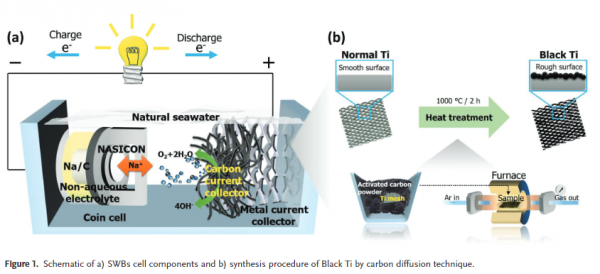Prevention of Carbon Corrosion by TiC Formation on Ti Current Collector in Seawater Batteries
- Journal
- Advanced Functional Materials
- Year
- 2023
- Link
- https://doi.org/10.1002/adfm.202213853 1203회 연결
Seawater batteries (SWBs) are a type of sodium-air batteries that use abun-dant seawater as the source of the catholyte. A cathode current collector in traditional SWBs is composed of titanium (Ti) and carbon-based current collectors. The high contact resistance between Ti and carbon-based cur-rent collectors as well as the slow kinetics of oxygen evolution and reduc-tion reactions increase the overpotential, resulting in side reactions such as carbon corrosion. To enhance the performance of SWBs, previous studies have focused on carbon current collectors, catalysts, and polymer binders, while ignoring the importance of Ti. In this study, a facile carbon diffusion technique is employed to successfully form titanium carbide (TiC) on the surface of Ti. SWBs with engineered Ti demonstrate considerably improved performance (four times higher cycling stability, 30% increased power perfor-mance, 40% reduced voltage gap) in relation to those with pristine Ti. This significantly improved electrochemical performance is found to be attribut-able to the prevention of carbon corrosion due to i) the reduction of contact resistance (owing to rough TiC surface) and ii) the electrocatalytic effect of TiC. Finally, engineered Ti is applied to large-area SWBs and its potential applicability in energy storage systems is confirmed.

